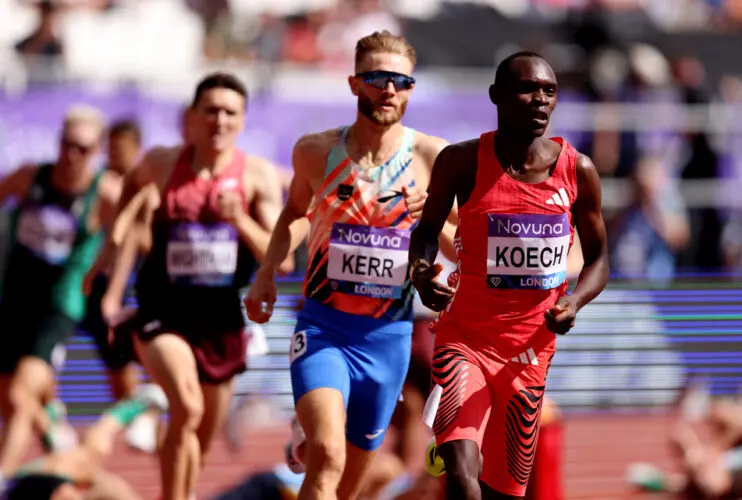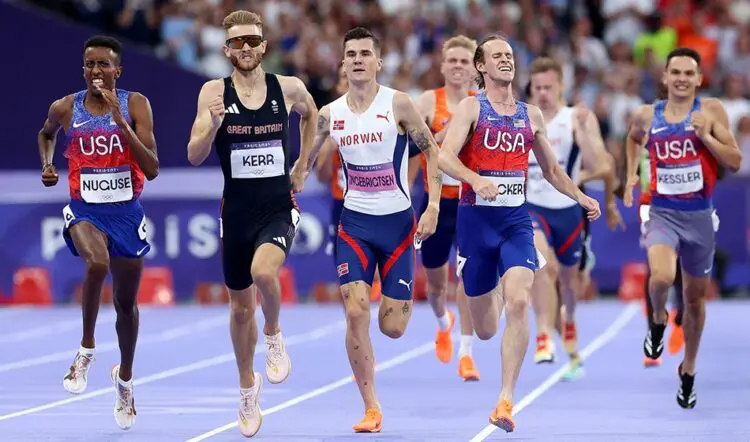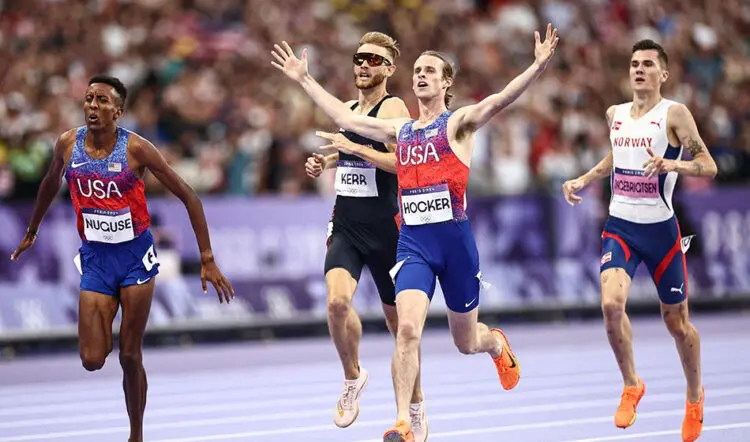There’s a softer side to Josh Kerr that is in stark contrast to the ultra competitive athlete that the public sees
According to his coach, Danny Mackey, there are two sides to Josh Kerr. One is the super confident, hyper competitive figure that the public sees and is also only too happy to throw in the occasional verbal hand grenade to provoke a reaction from his opponents. The other is the softer, “thoughtful” individual who dotes on Mackey’s three-year-old daughter and “makes you feel cared for”. Both are very real, but to see the latter traits as some kind of weakness would be a big mistake.
“My mentor, [the renowned coach] Dan Pfaff, does a lot of work with Special Forces, and one of the highest qualities in military people is empathy,” explains Mackey, head coach of the US-based Brooks Beasts group. “They're just softies and Josh is like that. He's very empathetic. But I think that quality makes him so competitive, because another side to empathetic people is that they put their heart into things, and they feel those things, and they wear their emotions on their sleeve.”
Does that empathy also mean the reigning world 1500m champion is better at reading the room, picking up signals from his opponents, and potentially using them to his advantage?
“For sure,” says Mackey. “He'll say things to me that, as a coach, I should be aware of first and I'll be like: ‘It's crazy that he watched a race of one of his competitors and picked up something on them’. And he'll do it during races, too. He’s reading them.
“It's almost like a boxer or an MMA fighter, where they’ll start reading their competitor’s patterns and picking up on the feints and head movements, their foot position and they're basically downloading it like a computer. He's very like that and I think the empathy is probably part of that. He’s a caring person, so that means he pays attention.”

Speaking to the Olympic silver medallist himself, it’s clear that he loves paying attention to every single aspect and detail of his job – whether that be be staying on top of his nutrition and sleep levels (“I set an alarm to go to bed and I’m an early riser so that means going to bed at 8pm”) – to using every opportunity to give himself an edge. Take the call room, for example.
“I absolutely love it,” grins Kerr, from the depths of his final pre-Tokyo training camp in Albuquerque. “There's something about it that I look forward to, and I don't know why. This year, we have a long call, with the warm-up area being a 15-minute drive from the stadium, so we practice that.
“It's something that, if you don't love, you truly hate. I can tell if someone loves it or hates it and I'll play with that a little bit. You’ve got to stay in your own processes a little bit but I think there's something special about seeing everyone in a pretty intense environment before you go out to war and I feel like I thrive in those situations.”
Given the nature of the 1500m in 2025, there will be some fresh faces for Kerr to keep an eye on in that Tokyo call room. His is an event that refuses to stand still and potential threats have been emerging from all directions.
At the London Diamond League, for example, Kerr was beaten by 18-year-old Kenyan Phaniel Koech, while Dutch European U23 champion Niels Laros is clearly rounding into form and Olympic champion Cole Hocker ran 3:30.37 at the US trials, yet found it only to be good enough for third behind Jonah Koech and the 22-year-old Ethan Strand. Olympic bronze medallist Yared Nuguse was forced down the Diamond League route in his attempts to reach the world championships.

The Scot’s response to widening array of oppositon is to highlight the difference between one-off performances and championship racing. He knows very well from personal experience about the gulf between the two.
“It's whoever's going to prepare the best, and whoever is going to be ready to win,” he says. With these championship races, it's experience. It's: ‘Have you been here before? Are you going to make mistakes? Are you feeling the pressure? How did your camp go? How fit are you?’ and I feel pretty confident in that so I'm very excited.
“For me, London 2017 [Kerr’s first world championships] was a very eye-opening experience. For younger athletes, it's less about fitness and more about an availability to having success – being excited to be there and just going out and really sending it.
“I had great fitness that day but I got knocked out in the first round. I looked left and right, and I was like: ‘There are seven or eight medals here’. I got the qualifying time by 0.01 – I ran 3:35.99 in college – and it’s just different.
“You’ve got to be willing to hurt and you’ve got to be willing to get after it. When it's the top six [going through] in a 12-person race, you’ve got to race it like that. You don't race to win, you race to get through and you’ve got to be scrapping. You’ve got to want it. It'll be an interesting first few rounds. I think there are going to be some shocks.”
There will be plenty to plan around, too.
“We're also going to be dealing with a 9am first round and then 10pm second round and final,” he adds. “I struggled with that at the [Tokyo] Olympics in 2021. I hadn't prepped for it properly – having a morning race and then turning into an evening race when, for us in the US, it's a 15-hour time difference.
“You’ve got to get your circadian rhythm down. You’ve got to make sure that you're getting there in enough time ahead of the event. You’ve got to go through your processes to be able to race in the morning and at night and these are the small things that we're looking at to make sure that we're not overlooking anything. I have my plan for each round and we work on that in practice a couple of times a week. If you're not prepped, and you're coming in without a plan, you’re not going to win.”

In recent years, particularly 2024, the 1500m narrative has revolved around Kerr’s rivalry with Jakob Ingebrigtsen. At the time of writing, it was still unclear if the Norwegian – who has not raced outdoors at all this summer due to injury – would make the start line in Japan. Has the recently crowned British 5000m champion missed the rough and tumble back and forth with his nemesis?
“I'm all for being yourself,” says Kerr. “I think both of us just answer questions the way we want to answer them, and we're very passionate about what we do, and we want to win.
“I think it would be nice to have him at the world championships ready to go. I would love that. I'm prepared for him to be at his best. I'm hoping for that, because I think anyone in the world is going to have a tough time dealing with me this month. And yes, it's frustrating not to have the best athletes at their best but everyone's got a lot going on in their lives.”
Kerr is well aware, though, that if Ingebrigtsen does show, he won’t be there just to make up the numbers.
“Anyone that's got a medal when it comes to a championship is going to be a threat.” he says. “I do think there's an element of, with a lack of racing this year, it's going to be a tough one to navigate but I think that anyone that has a medal always has a shot to get another one, because it's a skill. It's not a fitness thing. I think if you matched everyone's fitness on the start line, there’s not going to be that much of a difference, but it's ‘who's the winner?’ and if you have medals then you're a winner.”
It’s now over two years since Kerr sampled that winning feeling in Budapest with his world title and the 27-year-old quips that he’s responsible for “probably 50 per cent” of the views the race has received online.
Tellingly, though, he says: “I prefer to watch races that I don't do super well in, because you need to find the reasons why you don't win races and the reasons why other people do. It's very easy to watch the race that you won and be like: ‘Ah, perfect. That was great’, but I like the problem-solving aspect of it all. I'm looking to make decisions in 0.1 of a second and so, when I'm given a situation in front of me, I need to have a large bank of information of: ‘This equals this’ and so what we're working on at the moment is having lots of different plans and structures.”

Kerr is magnanimous when discussing the 1500m final at the Paris Olympics, where he came second to Hocker despite a British record-breaking run of 3:27.79. “Someone that can kick, reload and kick again in a 3:27 race… you're not going to beat that,” he says. “I couldn't beat that on the day.”
Yet the performance represented progress, which is what the 2024 world indoor 3000m champion is searching for. With no man having retained the world 1500m title since Asbel Kiprop in 2013, there’s another piece of history to take aim at.
“These are moments when you’ve got to pinch yourself and say: ‘There are not many more times in your career that you're going to come in as a reigning champion, ready to set the world on fire again,” he says. “It's a very privileged position to be in.”
